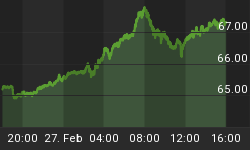As with December's rate hike, the European Central Bank had flagged today's 25 basis point increase in the refi rate so clearly that it was pretty much a done deal. The big question going into today's meeting was: "how hawkish will the bank and its governor sound after the fact?" The answer: "quite a lot."
The word "vigilant" disappeared from the post-decision statement, and Governor Trichet went out of his way to avoid use of the word in his subsequent Q&A session. So we can deduce that a rate hike currently is not in the cards for the April 6 meeting. However, rates clearly are headed upward.
Trichet noted that the ECB is "very much in the same state of mind as after the December decision" and reiterated his recent comments that "the markets understand what is driving our policy." I.E., market expectations of another rate hike at the June 8 meeting, and of a 3.0% refi rate by year's end, seem about right.
However, the language used today was distinctly less nuanced than after the rate hike on December 1. For one thing, there is more confidence about the growth outlook for the Eurozone. Trichet pointed out that recent indices and survey information suggest that economic activity is "improving." And, the bank's growth and inflation forecasts have nudged upward. The mid-point forecast for the Harmonized Index of Consumer Prices going into 2007 has been revised to 2.2%, not far off the bank's "below but close to 2.0%" target, but up from the 2.1% forecast given in December.
The ECB and the governor reiterated that risks to price stability remain to the upside. Yesterday's inflation data for the Euro-zone could be seen as a reason to ease off the monetary brakes - the flash estimate for February eased to 2.3% from 2.4% in January.

But, it is clear that the ECB is less concerned with the headline inflation numbers than with other data. The ECB statement noted "overall strong monetary and credit growth in an environment of ample liquidity in the euro area," while Trichet spoke of the recent "robust" rate of growth in M3 and of strong growth in credit to the private sector in recent months. Earlier this week came the news that both of these had picked up again in January. At 7.6% the rate of M3 growth is still well above the 4.5% that the ECB says is consistent with medium-term price stability.

Employment data is still disappointing in the major Euro-zone markets, and still-high rates of unemployment can weigh on consumer sentiment, but overall the labor market is a lagging indicator of economic recovery. Besides, sentiment indicators are looking up, especially in previously-glum Germany. The Euro-zone's overall economic sentiment index for February, released yesterday, hit a five-year high with consumers, industry, and the retail sector all feeling more optimistic.

Today we learned that German retail sales climbed a much-better-than-expected 2.7% on the month in real terms in January. Machinery and plant orders soared 25% from January 2005 levels, with domestic demand up 27% and foreign 24% higher. Similarly, February's Eurozone PMI climbed to its highest level in 19 months, thanks to surging output and new orders, particularly in Germany and (surprisingly) in Italy.
With Germany apparently at the start of a broad-based recovery and liquidity still ample across the 'zone, another 25bp rate hike is probable on June 8 - and possibly as early as May 4. Upcoming Euro-zone data to watch will be February HCIP on March 16; February M3 data on March 28; and the next round of sentiment indicators on March 31. German data to watch include the ZEW investor sentiment indicator for March on the 14th, and particularly the Ifo business sentiment indicator on the 28th.
If most of these indicators continue to support the recovery story, market expectations of a May-June rate hike will firm up and the euro will breach $1.20 this month.
There is, of course, a wild card in all this that has yet to make its presence felt in the data series, the sentiment indicators, or the analysts' projections - bird flu. So far, the discovery of the aggressive H5N1 virus in various European countries has only affected consumption of chickens in a few markets, principally France and Germany. However, the bans now being imposed on poultry exports from France will eventually have a ripple effect on the wider economy. More to the point, once the wild birds begin their spring migrations from nowaffected regions in Africa back to the European mainland, more reports of dead swans could seriously rattle consumers. Such exogenous factors are the bane of forecasters everywhere.















